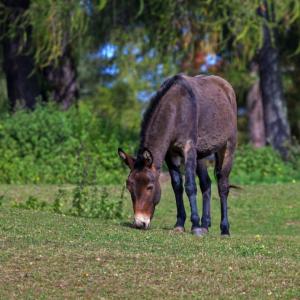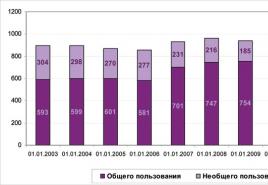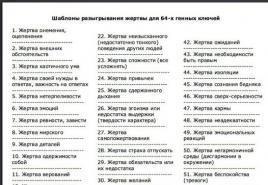Meat products in English. Food in English: names of foods, drinks, meals
Very often, my new students are faced with the question: “How to get into a conversation? It seems to understand, I understand, but I can't say anything. " There is only one answer to this question: to speak! The communicative approach to language teaching is a good thing and has long been shown to be effective. And this is exactly what we do in the classroom on the practice of speech communication. The lesson is based on questions and answers, various situations, role-playing games. For most of the lesson, we talk with the students - we discuss news, films, books, events, various lexical and grammatical topics. And when a student starts to try to speak English, then he realizes that he lacks vocabulary... Therefore, to help my students, I decided to develop manuals with vocabulary by topic. Moreover, each topic includes not only the most common words for every day, but also idioms, phrasal verbs, as well as stable word combinations. Before each lesson, I send these manuals and ask, if possible, to learn as many words and phrases as possible. Then, we discuss the given topic, during which the student has a lot of opportunities to use the words that he learned the day before. Thus, we work with words and they pass from passive memory to active memory. I decided to gradually lay out these manuals on topics in the blog, and I will only be glad if they are useful to someone. You can work with them independently or use them in a lesson with your English teacher.
|
Vegetables |
|
| carrot | carrot |
| aubergine | eggplant |
| cauliflower | cauliflower |
| onion | onion |
| garlic | garlic |
| leeks | leek |
| broccoli | broccoli |
| cabbage | cabbage |
| cucumber | cucumber |
| tomato | a tomato |
| potato | potatoes |
| courgette | squash |
| spinach | spinach |
| mushrooms | mushrooms |
| beans | beans |
| peas | peas |
| pepper | pepper |
| orange | orange |
| banana | banana |
| pear | pear |
| grapes | grapes |
| strawberry | strawberry |
| apple | an Apple |
| lemon | lemon |
| peach | peach |
| melon | melon |
| water melon | watermelon |
| cherry | cherry |
| kiwi | kiwi |
| pineapple | a pineapple |
| beef | beef |
| lamb | lamb |
| mutton | mutton |
| venison | venison |
| liver | liver |
| kidneys | kidneys |
| veal | veal |
| pork | pork |
| bacon | bacon |
| ham | ham |
| chicken | a hen |
| turkey | turkey |
| duck | duck |
| goose | goose |
| curry | curry |
| nutmeg | nutmeg |
| cinnamon | cinnamon |
| ginger | ginger |
| tea | tea |
| coffee | coffee |
| fruit juice | fruit juice |
| milk | milk |
| beer (lager / ale) | beer (light beer / ale) |
| wine | wine |
| mineral water (sparkling / still) | mineral water (still / still) |
| fizzy drink / carbonated drink / lemonade / pop * (Slang) / soft drink / soda (Am.Eng.) | lemonade, carbonated drink |
| cider | cider |
| spirits | alcohol, spirits |
Pop * - means not only lemonadebut also all carbonated drinks including champagne.
Since this is slang, it can be translated into Russian by the word "pop".
|
Bakery Goods |
|
| tart | open pie |
| pasty | pie |
| pie | closed pie |
| bread | bread |
| bun | bun, bun |
| Swiss roll | roll with jam |
| donut | donut |
| muffin | mini cupcake |
| meringue | meringue |
| éclair | eclair |
| cupcake | cake baked in a corrugated mold |
|
Miscellaneous |
|
| vinegar | vinegar |
| (vegetable) oil | vegetable oil |
| cake | cake |
| (boiled / fried) egg | (boiled / fried) egg |
| butter | butter |
| soup | soup |
| honey | honey |
| sugar | sugar |
| flour | flour |
| salt | salt |
| yeast | yeast |
| a tin of sprats | can of sprat |
| a can of pop | can of lemonade (fizzy) |
|
Flavors and Tastes |
|
| bitter | bitter |
| sour | sour |
| hot | acute |
| spicy | spiced |
| sweet | sweet |
| savory | unsweetened (any flavor other than sweet) |
| salty | salty |
| bland | fresh |
| tasty / Delicious | delicious |
| tasteless | tasteless |
| sickly | sugary |
|
Ways of cooking |
|
| boil | to cook |
| fry | fry |
| bake | bake |
| roast | roast in the oven |
| grill | grill |
| season | season with salt and pepper |
| cube / dice | cut into cubes |
| slice | cut into thin layers, slices |
| chop | chop, chop |
| whip | whip |
| stir | stir, stir |
| steam | soar |
| big cheese e.g. I managed to talk to the big cheese himself. |
biggie, big shot |
| wine and dine e.g. We were wined and dined every night and given the best hotel in town. |
treat, feed, water |
| butterfingers e.g. What a butterfingers! You keep dropping things. |
awkward, awkward, gaping, muddlehead |
| cream of the crop e.g. This is going to be a very important party. Cream of the crop will be there. |
cream of society, best of the best, important |
| cup of tea e.g. Such shows are not my cup of tea. |
something or smb. according to taste |
| use your noodle e.g. Use your noodle to understand what’s going on! |
move your brains, think |
| to be nuts about e.g. I am nuts about Chinese food. |
to be a passionate admirer of someone / |
| a smart cookie e.g. She is a smart cookie and always gets excellent grades. |
smart, cunning, dodgy |
| bring home the bacon e.g. I need a job to bring home the bacon. |
earn (for bread and butter) |
| to be in the soup e.g. Oh, no! I’ve broken mum’s favorite vase. Now I’m really in the soup. |
get into trouble |
| a couch potato e.g. Come on, let’s go out or you will turn into a coach potato. |
couch potato, slothful, lazy |
| to be full of beans e.g. I don’t want to sleep any more after that coffee, I am full of beans. |
cheerful, energetic |
| a chicken e.g. You are such a chicken if you are afraid to ask Elisabeth out. |
coward, cowardly |
| a lemon e.g. This telephone is a real lemon! It keeps breaking down! |
unusable thing |
|
Collocations |
|
| Chinese / Mexican / Spanish food / cooking / cuisine | chinese / Mexican / Spanish cuisine |
| light meal | light snack / dinner |
| family meal | family lunch / dinner |
| festive meal | festive lunch / dinner |
| substantial meal | hearty lunch / dinner |
| ready meals | ready meals |
| processed foods | semi-finished products |
| hearty breakfast | hearty breakfast |
| refreshing drink | soft drink |
| die of hunger | starve to death |
| have a quick snack | have a bite to eat, kill a worm |
| perishable food | perishable food |
| junk food | dry food; harmful, unhealthy food |
| fresh produce | fresh food |
| home-cooked food | homemade food |
| food poisoning | food poisoning |
Online pronunciation of vegetable names in English... Vegetables are an important part of any person's diet. They contain carbohydrates and proteins, are a source, sometimes the only one, of irreplaceable biologically active substances. Having an alkaline reaction, vegetables neutralize acids that are formed when eating meat and flour dishes, deliver vitamins to the body, primarily vitamin C, as well as B1, B2, E, PP, K, provitamin A, supply vital minerals: calcium, phosphorus, magnesium, sulfur, iron, nitrogen. They contain enzymes and organic acids, fiber and pectins, which allow to regulate the digestion processes and microflora of the gastrointestinal tract,
Meat products
 Online pronunciation of the names of meat products. Meat, as a food, has always been known to mankind, in all epochs of its development, and often served as the basis for its survival in ancient times. The "energy reserve" that the protein-rich meat food gave people, raised meat to the rank of one of the most widespread and revered foods in the world.
Online pronunciation of the names of meat products. Meat, as a food, has always been known to mankind, in all epochs of its development, and often served as the basis for its survival in ancient times. The "energy reserve" that the protein-rich meat food gave people, raised meat to the rank of one of the most widespread and revered foods in the world.
Fast food
 Online pronunciation of fast food in English Fast food exists in the national cuisine different countries the world (for example, Italian pizza). In 1921, the White Castle company was opened in Kansas, whose signature dish was outlandish hamburgers at that time. The stable price (5 cents until 1946) and outlandishness attracted buyers, and doubts about the safety of the product were dispelled as a result of a cunning move by the owner of the company Billy Ingram (when specially hired people in white coats gave the impression that even doctors were buying hamburgers). In the late 1940s, White Castle began to have competitors, of which McDonald's became the most serious.
Online pronunciation of fast food in English Fast food exists in the national cuisine different countries the world (for example, Italian pizza). In 1921, the White Castle company was opened in Kansas, whose signature dish was outlandish hamburgers at that time. The stable price (5 cents until 1946) and outlandishness attracted buyers, and doubts about the safety of the product were dispelled as a result of a cunning move by the owner of the company Billy Ingram (when specially hired people in white coats gave the impression that even doctors were buying hamburgers). In the late 1940s, White Castle began to have competitors, of which McDonald's became the most serious.
 Online pronunciation of fruit names in English. Fruit is a juicy edible fruit of a tree or shrub. Fruit is an important component of human and animal food. In the Old Russian language the word “fruit” did not exist, any fruits were called vegetables or vegetables, the word “fruit” was borrowed in 1705.
Online pronunciation of fruit names in English. Fruit is a juicy edible fruit of a tree or shrub. Fruit is an important component of human and animal food. In the Old Russian language the word “fruit” did not exist, any fruits were called vegetables or vegetables, the word “fruit” was borrowed in 1705.
 Online pronunciation of the names of berries in English. The benefits of berries are manifested due to their unique vitamin and mineral composition. Vitamins A and C act as antioxidants and protect cells from damage and premature aging. Berries contain a lot of dietary fiber that stimulates metabolism. All berries contain a lot of potassium, which is very beneficial for the normal functioning of the cardiovascular system. Potassium is able to normalize high blood pressure, strengthen the heart muscle, and together with antioxidant vitamins and strengthen blood vessels. There are quite a lot of sugars in berries, which must also be taken into account when using them., you need to comply with the norm (no more than 400g of fruits and berries per day /)
Online pronunciation of the names of berries in English. The benefits of berries are manifested due to their unique vitamin and mineral composition. Vitamins A and C act as antioxidants and protect cells from damage and premature aging. Berries contain a lot of dietary fiber that stimulates metabolism. All berries contain a lot of potassium, which is very beneficial for the normal functioning of the cardiovascular system. Potassium is able to normalize high blood pressure, strengthen the heart muscle, and together with antioxidant vitamins and strengthen blood vessels. There are quite a lot of sugars in berries, which must also be taken into account when using them., you need to comply with the norm (no more than 400g of fruits and berries per day /)
 Online pronunciation of names of drinks in English. Drink (from Ch. Nourish) - a liquid intended for drinking. Water is the basis of most beverages consumed by humans, it is consumed both in pure and carbonated or mineralized form (both extracted from natural mineral sources and with additives)
Online pronunciation of names of drinks in English. Drink (from Ch. Nourish) - a liquid intended for drinking. Water is the basis of most beverages consumed by humans, it is consumed both in pure and carbonated or mineralized form (both extracted from natural mineral sources and with additives)
Sweets in English
 Online pronunciation of names of sweets in English. The first sweets appeared in Ancient Egypt and Greece. Then they were desserts made from honey and fruits or dates. Nuts were also added to them. Home-made sweets were common until the 20th century, they were prepared and sold wholesale and retail
Online pronunciation of names of sweets in English. The first sweets appeared in Ancient Egypt and Greece. Then they were desserts made from honey and fruits or dates. Nuts were also added to them. Home-made sweets were common until the 20th century, they were prepared and sold wholesale and retail
Food
 Online pronunciation of food names in English with transcription. Oddly enough, but one of the incentives for the development of technologies for long-term storage of products were numerous wars. So, for example, Napoleon even announced a special competition for the invention better way storage of food. After all, his army during long campaigns needed provisions. The French scientist Nicolas François Apper won this competition. It was he who decided to subject the products to heat treatment and then place them in hermetically sealed containers.
Online pronunciation of food names in English with transcription. Oddly enough, but one of the incentives for the development of technologies for long-term storage of products were numerous wars. So, for example, Napoleon even announced a special competition for the invention better way storage of food. After all, his army during long campaigns needed provisions. The French scientist Nicolas François Apper won this competition. It was he who decided to subject the products to heat treatment and then place them in hermetically sealed containers.
Nuts and seeds
 Nuts and seeds - online pronunciation in English. In nuts, useful minerals - magnesium, potassium, calcium, iron, phosphorus, etc., are 2-3 times more than in many other food products. All varieties of nuts are rich in vitamins A, E, group B, P. In addition, nuts have another important advantage: all the nutrients in them are stored for a very long time, unlike, for example, vegetables and fruits that lose most of their vitamins and minerals for one winter.
Nuts and seeds - online pronunciation in English. In nuts, useful minerals - magnesium, potassium, calcium, iron, phosphorus, etc., are 2-3 times more than in many other food products. All varieties of nuts are rich in vitamins A, E, group B, P. In addition, nuts have another important advantage: all the nutrients in them are stored for a very long time, unlike, for example, vegetables and fruits that lose most of their vitamins and minerals for one winter.
Irish breakfast
 Online pronunciation titles irish breakfast foods in English. Traditional irish breakfast consists of the following ingredients: pork sausages, bacon bits, eggs, blood sausage, white sausage, tea or coffee, and toast or traditional soda bread.
Online pronunciation titles irish breakfast foods in English. Traditional irish breakfast consists of the following ingredients: pork sausages, bacon bits, eggs, blood sausage, white sausage, tea or coffee, and toast or traditional soda bread.
Chicken egg dishes
 Online pronunciation names of dishes prepared from chicken eggs in English. The taste of the egg depends entirely on the taste of the yolk., and the taste of the yolk is from what the chicken is fed... Homemade eggs are tastier than factory eggs. To give eggs a special taste, chickens are sometimes specially fed with spices.
Online pronunciation names of dishes prepared from chicken eggs in English. The taste of the egg depends entirely on the taste of the yolk., and the taste of the yolk is from what the chicken is fed... Homemade eggs are tastier than factory eggs. To give eggs a special taste, chickens are sometimes specially fed with spices.
What is an apple made of
What an apple consists of - online pronunciation in English with transcription. Apples are low in calories. 100 g of fresh apple contains only 47 kcal. The product is practically free of fat, but it contains carbohydrates, which allows a person who has consumed an apple to maintain a feeling of fullness for a long time. Great for those who want to lose weight and those who are on a diet. 100 g of baked apples contain almost 66 kcal and will also not harm the figure. But 100 g of dried apples have 253 kcal, so you shouldn't get carried away with them if you want to keep your weight.
B-B-Q
 Online pronunciation grilled products. Both barbecue and shish kebab are an open-air celebration. Americans call this type of recreation barbecue, the British call it barbecue or grill, the Germans call it grill, and the Russians call it barbecue.
Online pronunciation grilled products. Both barbecue and shish kebab are an open-air celebration. Americans call this type of recreation barbecue, the British call it barbecue or grill, the Germans call it grill, and the Russians call it barbecue.
Edible oils
 Online pronunciation of oil names in English with transcription and pronunciation in Russian letters... Oil is a collective name for a number of chemical substances or mixtures of substances not soluble in water. There are three main groups of "oils": some "oils" are fats, mineral oils are refined petroleum products
Online pronunciation of oil names in English with transcription and pronunciation in Russian letters... Oil is a collective name for a number of chemical substances or mixtures of substances not soluble in water. There are three main groups of "oils": some "oils" are fats, mineral oils are refined petroleum products
Sugar honey syrup
 Online pronunciation titles in English: sugar, honey, syrup... Sugar is the common name for sucrose. Cane and beet sugar is an important food product. Plain sugar refers to carbohydrates, which are considered valuable nutrients to provide the body with the energy it needs.
Online pronunciation titles in English: sugar, honey, syrup... Sugar is the common name for sucrose. Cane and beet sugar is an important food product. Plain sugar refers to carbohydrates, which are considered valuable nutrients to provide the body with the energy it needs.
Condiments spices
 Online pronunciation names of seasonings used in cooking. People began to use aromatic and spicy plants for cooking long before salt. Today it is impossible to establish what exactly motivated the ancient people: whether they wanted to improve the taste and smell of food, whether they tried to get new taste qualities of familiar dishes and products, or added spices knowing about their beneficial properties.
Online pronunciation names of seasonings used in cooking. People began to use aromatic and spicy plants for cooking long before salt. Today it is impossible to establish what exactly motivated the ancient people: whether they wanted to improve the taste and smell of food, whether they tried to get new taste qualities of familiar dishes and products, or added spices knowing about their beneficial properties.
Milk products
 Online pronunciation of dairy product names in English. Fermented milk products are isolated from a large family of dairy products - those that are produced by fermenting milk with various bacteria. So, yogurt is fermented with a Bulgarian bacillus, acidophilus - with acidophilic bacillus, rennet cheeses - with rennet secreted from the stomach of calves, and homemade curdled milk and cottage cheese can be prepared thanks to the work of lactic acid lactococcus, which is constantly found in spontaneously sour milk.
Online pronunciation of dairy product names in English. Fermented milk products are isolated from a large family of dairy products - those that are produced by fermenting milk with various bacteria. So, yogurt is fermented with a Bulgarian bacillus, acidophilus - with acidophilic bacillus, rennet cheeses - with rennet secreted from the stomach of calves, and homemade curdled milk and cottage cheese can be prepared thanks to the work of lactic acid lactococcus, which is constantly found in spontaneously sour milk.
 Plural names for fruits. Fruit is mainly digested in the intestines and not in the stomach. In addition, they are absorbed fairly quickly (some in as little as an hour or less). Our brains run on glucose, and fruits are the best source of blood sugar.
Plural names for fruits. Fruit is mainly digested in the intestines and not in the stomach. In addition, they are absorbed fairly quickly (some in as little as an hour or less). Our brains run on glucose, and fruits are the best source of blood sugar.
Online pronunciation of names: vegetables, fruits, berries and other food products in English with transcription, translation and pronunciation in Russian letters.
It is important for every living creature to have food and drink. In the morning, we usually have breakfast, around the noon we have lunch, and in the evening we have dinner. Sometimes we eat at home, and sometimes we go to a restaurant or cafe. Many people can cook delicious food by themselves.
Our food consists of fruits, vegetables, cereals, meat and fish. We also eat dairy. Cooks can prepare different dishes from these products. They use recipes. Different nationalities have their own cuisine.
Some people today don’t eat meat and fish, they are called vegetarians. Some people often watch their diet to lose weight or to be healthy. Then they don’t eat food with sugar, flour and fat.
What do we usually drink? It is known that every person should drink plenty of water - about 2 liters a day. But we also drink other beverages like tea, coffee, milk, juice, wine, and lemonade.
Food and drink
It is important for every living being to have food and drink. In the morning we usually have breakfast, around noon we have lunch, and in the evening we have dinner. Sometimes we eat at home, and sometimes we go to a restaurant or cafe. Many people can prepare delicious meals themselves.
Our food consists of fruits, vegetables, cereals, meat and fish. We also eat dairy products. Chefs can prepare a variety of dishes using these products. They use recipes. Different nationalities have their own cuisine.
Some people today do not eat meat and fish, they are called vegetarians. Some people often follow their diet to lose weight or stay healthy. Then they do not eat food with sugar, flour and fat.
What do we usually drink? It is known that everyone should drink plenty of water - about 2 liters per day. But we also drink other drinks like tea, coffee, milk, wine, lemonade.
Beginners of learning English need not only to understand the grammatical intricacies, but also to constantly replenish their vocabulary. It is much easier to do this when the words are not scattered in different categories, but grouped into thematic blocks. Today we will get acquainted with a large volume of active vocabulary, with the help of which drinks and food are indicated in English. The topic is undoubtedly extremely important, because study is study, and lunch should always be on schedule! We will learn how to express the processes of food intake, we will learn how to designate the names of dishes and use common phrases when going to cafes and restaurants
Vocabulary: Food and drinks - Names of food and drinks
Before learning how to make whole sentences, you need to accumulate as many names of food as possible in your dictionary. The tables below summarize the main types of product designations in English with translation. These expressions will be useful in speech in order to indicate your favorite and unloved dishes, or to conduct a simple dialogue with the waiter.
|
Fruits / vegetables vegetables / fruit |
|
Fruits:
|
Vegetables:
|
|
Meat/ bird/ a fish - meat / poultry / fish: |
|
Meat:
Bird:
|
A fish:
|
|
Drinks - drinks: |
|
Simple:
Hot:
|
Alcoholic:
|
A list of words about food would be incomplete without specifying grains and spices. Let's eliminate these gaps.
Of course, when communicating on the topic of nutrition, it is impossible to do without the corresponding verbs and adjectives. Here are the most common examples.
| Verbs | Adjectives / participles |
|
|
All vocabulary cannot fit in one teaching material, but it was not right, because it is impossible to learn hundreds of words at once. We have tried to give small, but frequently used thematic blocks in the language. Next, we will consider several everyday situations, one way or another related to nutrition.
Food in English when expressing the time of day
Most often, in conversations there are moments associated with regular meals. That is, we want to tell the interlocutor about what we ate for breakfast, lunch or dinner. In order to build such a dialogue, it is necessary to learn the designation of these processes. Let's consider them using the table and at the same time give examples of popular dishes.
| Traditional food | ||
| Schedule | Related words | English food |
| Breakfast - breakfast. Brunch is rarely used. |
have breakfast - have breakfast; at breakfast - during breakfast; for breakfast - for breakfast; |
bacon and eggs - fried eggs with bacon; toasts with jam - toasts with jam; porridge - porridge; sandwiches - sandwiches; pancakes - pancakes; corn-flakes - corn flakes; |
| Dinner / Lunch - lunch (lunch denotes a lunch break during the working day). |
have dinner / have lunch - have lunch; at dinner - at lunch; for dinner - for lunch; |
beefsteak - steak; chicken soup - chicken soup; roast beef - roast beef; Caesar's salad - Caesar salad; cutlet - cutlet; mashed potatoes - mashed potatoes; |
| Supper - dinner | have supper - have supper; at supper - during dinner; for supper - for dinner; |
pizza - pizza; fried fish - fried fish; chicken - chicken; lasagna - lasagna; pilaf - pilaf; potatoes with vegetables - potatoes with vegetables; |
As you can see from the examples of dishes, traditional British cuisine is quite mixed with American and European. Good or bad, let's leave it to the true British to decide, but for us, such a simplification is very useful, because you can always find familiar names in the menu. By the way, let's consider how you should behave in catering establishments.
Situations in a cafe and restaurant
Of particular interest for the traveler, and for those who move to English-speaking countries for permanent residence, is a visit to restaurants and cafes. What expressions should be used so as not to lose face? Let's analyze the main words on the topic "visiting a restaurant" and see how you can make a dialogue with the waiter.
| In a cafe and restaurant | ||
| Cutlery | Dishes | Phrases for dialogue |
| plate - plate napkin - napkin; knife - knife; spoon - spoon; saucer - saucer; glass - glass; corkscrew - corkscrew; decanter - decanter; cup - cup; fork - fork; salad servers - appliances for salad; tea spoon - a teaspoon; goblet - glass; sauce boat - device for sauce; tray - tray; dessert plate - dessert plate; |
side dishes - side dishes; tuna salad - tuna salad; vegetable soup - vegetable soup; beef filet - beef roll; lamb chops - lamb chops; grilled fish - grilled fish; lobster - lobster; baked chicken - baked chicken; apple pie - apple pie; ice-cream - ice cream; cheesecake - cheesecake; |
We would like to book a table for tonight - We would like to reserve a table for tonight;
Can you get the waiter? - Could you call the waiter? We would like a menu, please - Giveus,you are welcome,menu. I am ready to order - I'm ready to order now. Could you bring me ..., please? - Could you please bring me ... please? We’ll have two rice with vegetables and a Greek salad, please - Us,you are welcome,tworicefromvegetablesandgreeksalad. A glass of (water, juice, red / white wine and etc.), please - Wineglass (water,juice,red /whitewine),you are welcome. Can you get me another (coffee, tea, pizza, salad and etc.) and the check, please? - Not could would you bring to me yet one (coffee, tea, salad, pizza and t. p.) and score, you are welcome. Waiter, can we have the bill, please? - Waiter,canusyou are welcome,score? |
We did a good job in today's class! We learned how food is indicated in English, what dishes are popular with the British, and even got a little captivated by the topic of visiting cafes and restaurants. Do not lose your determination and diligence, and you will definitely be able to master foreign language in excellence! Good luck!
Traditional English food has been greatly influenced by other national cuisines in recent years. Despite this fact, if you travel to Britain, you can still be served up traditional English dishes in a restaurant or at a hotel.
A typical English breakfast is usually quite big and substantial. It includes pork sausages, bacon and eggs, tomatoes, baked beans, mushrooms and a toast. Some people enjoy porridge, fruit and yogurt in the morning, followed by a toast and jam, or orange marmalade. A traditional breakfast drink is tea, which British people prefer having with cold milk. Another popular morning drink is orange juice.
For many Englishmen lunch is a fast meal. In big cities there are a lot of sandwich bars where office clerks can choose all sorts of sandwiches with meat, fish, chicken, ham, prawns, eggs, cheese, vegetables and lettuce. Russian pubs also serve good food for lunch, hot and cold. Quite a lot of workers go to famous “fish and chips shops” and buy their favorite deep fried cod or haddock with French fries.
A lot of Englishmen drink their 5 o'clock tea. It's a traditional light meal after work. People enjoy their favorite teas with cookies, cakes, freshly baked sweet buns, scones and other pastries.
British people eat their evening meal at about 7 o'clock, when all members of the family are at home together. As a rule, a typical dinner is meat and vegetables. It can be roast chicken or lamb with potatoes, or steamed vegetables with meat gravy. For dessert, English wives cook various puddings and serve them with ice-cream or jam.
On Sundays British families like to sit together at the table enjoying roast beef, lamb or chicken, served with Yorkshire pudding and dressed with English mustard, apple sauce, cranberry sauce or mint sauce.
English food is simple but very delicious. Today it continues to merge in national cuisines from all over the world.

Transfer
The traditional english food in last years strongly influenced by other national cuisines. Despite this fact, if you travel to the UK, you may still be served traditional English food in a restaurant or hotel.
A typical English breakfast is usually quite large and substantial. It includes pork sausages, bacon and eggs, tomatoes, baked beans, mushrooms and toast. Some people like to eat porridge, fruit and yogurt in the morning, followed by toast with jam or orange marmalade. The traditional breakfast drink is tea, which the British like to drink with cold milk. Another popular morning drink is orange juice.
For many Englishmen, lunch is a quick meal. In big cities, there are many sandwich bars where office clerks can choose any kind of sandwich with meat, fish, chicken, ham, shrimp, eggs, cheese, vegetables and lettuce. English pubs also serve good food for lunch, hot and cold. Quite a few workers go to the famous Fish and Chips cafes and buy their favorite deep-fried cod or haddock and chips there.
Many Englishmen drink five-hour tea. This is a traditional light meal after work. People enjoy their favorite tea with cookies, cakes, freshly baked sweet rolls, tortillas and other pastries.
The British have dinner at about 7 o'clock in the evening, when all family members are at home together. Typically, a typical dinner consists of meat and vegetables. This can be roast chicken or lamb with potatoes, or steamed vegetables and meat with gravy. For dessert, English wives prepare various puddings and serve them with ice cream or jam.
On Sundays, British families love to sit down and enjoy roast beef, lamb or chicken, served with Yorkshire pudding and spiced with English mustard, applesauce, cranberry sauce, or mint sauce.







